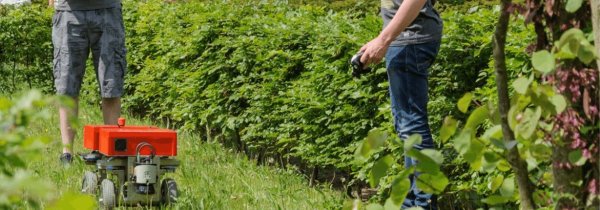Master's Biosystems Engineering
The master's programme Biosystems Engineering focuses on the development of technology for the production, processing and storage of food and agricultural non-food, management of the rural area, renewable resources and agro-industrial production chains. In all cases it concerns innovation and sustainable technology.
The interaction between technology, plants, animals, the environment and society plays a central role. Developments in society at large, often involve the development of new technology. The adoption of new technology and its integration within existing processes therefore requires special attention.

Why this programme?
- Innovative solutions for challenges in agriculture and food production
- A lot of flexibility: develop your individual study program
- Apply engineering skills in a living environment
Study programme of Biosystems Engineering
The master's programme of Biosystems Engineering is a two-year programme, where students pursue their interests through courses in the first year followed by the master's thesis and an internship in the second.
More information about the structure of the programme can be found on the Programme of Biosystems Engineering page. You can also see what this master's programme deals with it on the Compare Biosystems Engineering Sciences.
Thesis tracks
Within the master's programme you can choose from the following thesis tracks to meet your personal interests.

Farm Technology
This track focuses on innovation and technology that can be introduced to improve or revamp an agricultural system. Robotics and automation in horticulture, livestock and poultry systems are extensively researched.

Geo information science & Remote Sensing
The GRS track focuses on using spatial and remote sensing data to monitor and develop models for the agricultural, urban and natural environments. Agricultural practice opens up many opportunities of research, business and society.

Mathematical and Statistical Methods
The thesis track MAT focusses on development of models to get a better understanding of the world around us. One could think of smart ventilation for food storage. How can we model Greenhouses, so that we can make design choices?

Information Technology
Data has an important role in the society. This track offers students to perform their research oriented towards the design, implementation and management of information systems that can be used in agricultural systems.

Environmental Technology
Environment technology deals with research on using renewable sources of energy and reusing waste products and by-products. You design processes that reuse wastes into distinct, reusable components so that a closed cycle can be achieved in agricultural systems.

Operations Research and Logistics
The goals of logistics are producing or getting the right product, in the right quantity and quality, at the right time and place as efficient as possible while fulfilling the requirements of the stakeholders. This requires the design of innovative logistical concepts in agri-food networks.

Biobased Chemistry and Technology
With the importance of biobased economies increasing, challenges towards energy savings and use of renewable energy needs to be addressed. The biomass of plants and animals, including waste can be converted into a broad spectrum of marketable products and energy.
Application and admission
Interested in taking part in the programme of Biosystems Engineering? Find out more about the specific Admission requirements and the application procedures.
Student experiences
The best way to get to know a place is by getting to know the people. Students share their experiences with you about the master's programme and student life in Wageningen on the page Student experiences.
What moves me? Linking technology and nature for sustainable innovations.
Future career
What are your possibilities after graduating? Read more about Career perspectives and opportunities after finishing the programme.